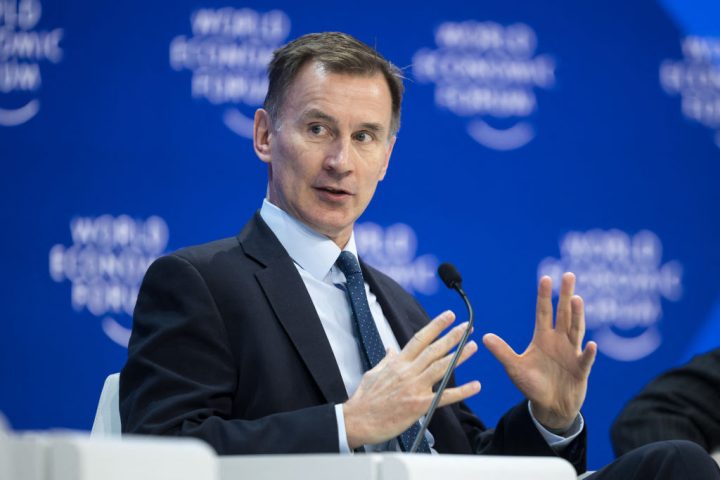The Tory party’s plan to further cut taxes in the Spring Budget is not exactly a secret. Still, Jeremy Hunt’s suggestion at Davos that they are indeed coming has sparked imaginations – while his party continues to debate internally where these tax cuts should land.
Speaking on a panel at the World Economic Forum’s conference in Davos, Switzerland, the Chancellor gave his biggest indication yet about his priorities for the upcoming fiscal statement. ‘We note that the economies growing faster than us in North America and Asia tend to have lower taxes,’ he said. ‘I believe fundamentally that low-tax economies are more dynamic, more competitive and generate more money for public services like the NHS.’
Whatever choice Hunt makes, any decision to cut taxes won’t be simple
Of course, Hunt was careful to couch any talk of tax cuts by noting that whatever he does has to be possible within the scope of the public finances. ‘It is too early to say what we are going to do,’ he noted, while also being clear that ushering in lower taxes is the ‘the direction of travel we would like to go in’. Hunt used up almost all of his £27 billion fiscal windfall in the autumn to make full expensing for businesses permanent and take 2p off employee National Insurance. He will soon get more information from the Office for Budget Responsibility about what his fiscal headroom might be this time around. The billions he has to work with will help determine whether he opts for some kind of income tax cut (the direction the government has been leaning in recent months, as it would be perceived as the tax cut to help the most people), a reduction in inheritance tax or – as some Tory MPs are hoping – a combination of the two.
Whatever choice Hunt makes, any decision to cut taxes won’t be simple. The decision, made at the end of last year, to prioritise tax cuts was quickly flagged as a trade-off to filling the OBR’s predicted £19 billion ‘black hole’ in public services over the next parliament as departmental budgets fall behind inflation. Those questions will remain – and grow louder – in the Spring Budget if (as expected) more money once again goes on tax cuts than public spending.
It’s the view of the Treasury that the £19 billion figure is not all it seems: even marginal productivity gains in the public sector could help reduce it significantly. But this isn’t Hunt’s only challenge. It remains tricky for the government to talk about the overall tax burden when it is using a mega-stealth tax to bring in the revenue that’s enabling tax cuts in other areas. So long as the freezes to tax thresholds remain in place, it remains difficult for the government to claim it is meaningfully reducing the tax burden. Indeed, the tax cuts in the last Autumn Statement, while substantial, failed to move the dial on the overall tax burden. The OBR has estimated that by the end of the next parliament, there will be ‘nearly four million additional workers paying income tax, three million more moved to the higher rate and 400,000 more paying the additional rate’.
The mini business battle playing out between the Tories and Labour at Davos this year may have incentivised Hunt to ramp up discussion and speculation about tax cuts. Shadow chancellor Rachel Reeves has also been in the ski town this week, with both parties insisting the UK is ‘open for business’ and fighting it out to see who can more successfully attract investment and command confidence in the business community. Hunt is the first Tory Chancellor in five years to make an appearance at Davos; it seems he decided his speech had to leave an impression. But he has not answered the biggest questions around the tax debate going into the spring: that is, which taxes will be cut and how the party plans to make them sustainable and meaningful, without raising taxes elsewhere.







Comments